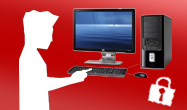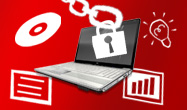PC Learning Center
Support & Drivers

Introduction
Security. Security. Security. That’s all we hear nowadays. Why? Because there are more threats than ever to your computer and your data. To help you understand the importance of security, HP has put together terms you should know and simple tips to help you protect your equipment and information. The more you know, the easier it is to protect yourself.
Protection from viruses

What is a virus? A computer virus is man-made code that disrupts a computer’s systems and destroys its data. It can be transmitted via an infected disc, over a network or the Internet, through downloads or by opening infected e-mails. And it’s the last thing you want on your PC.
Fortunately, you can protect yourself with antivirus software and other programs. But the best protection is to know more about viruses and how to spot signs that your computer may have one. Check out other articles in this topic for valuable virus-protection information.
Cut spam from your online diet
You know all that junk mail you get in your mailbox at home? Well, even more of it is headed to the inbox on your computer. “Spam,” another name for unsolicited e-mail, is illegal to send and often sent by companies offering questionable products, get-rich-quick schemes or illegal services.
Thankfully, you can stop spam by taking a few simple precautions. Read the other articles in this topic to find out more.
Keep your data safely where it belongs with a firewall

Think about the information available on your computer. Credit card and bank account numbers, financial statements, etc. What type of protection do you employ to keep it secure? If the word “firewall” doesn’t instantly come to mind, your data may be at risk. A firewall is a system of hardware and software that protects your data with a virtual wall around your network.
To learn more about firewall protection and why you need it, read the other articles in this topics.
PC privacy tips
Did you ever lose your wallet? If so, you’re familiar with the gut-wrenching feeling you get as your private information becomes public. Just like your wallet, your computer or personal digital assistant (PDA) also has personal and sensitive information on it. Information, which if not properly removed or protected, could fall into the wrong hands.
Use the following checklist to protect yourself.
- Empty your recycle bin often
- Set passwords to protect your system
- Clear history and cache of web browser
- Use a case to protect PDAs and a reward to recover lost ones
- Be cautious when clicking on web ads
- Consider installing pop-up blockers
For detailed information on computer privacy, read the other articles in this topic.
Protecting your computer and your information is something we all have to do. And you can always turn to HP for help. Visit HP’s Personal Computing and Security Center at www.hp.com/go/techcenter/security.